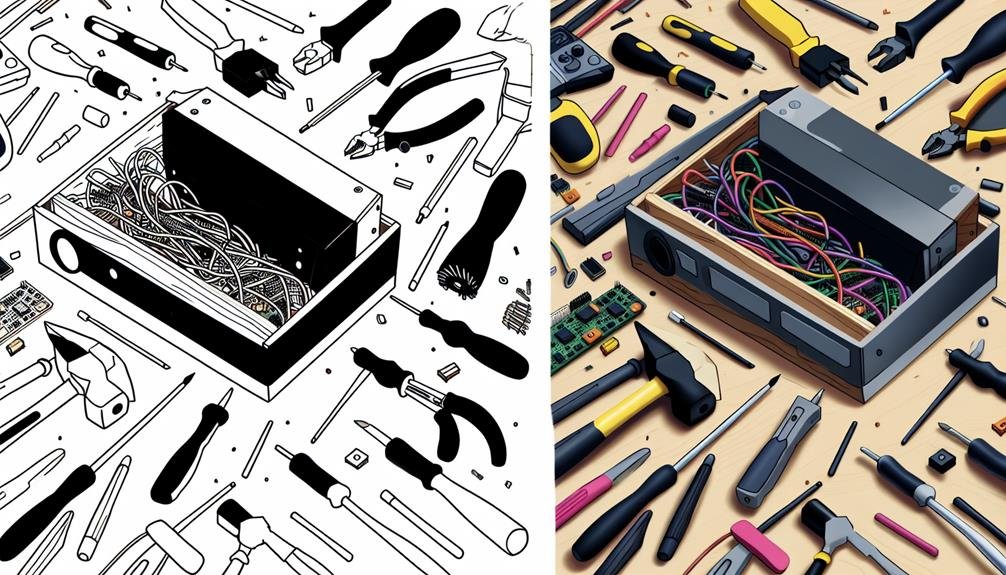Did you know that there is an ongoing debate among electronics enthusiasts regarding the superiority of DIY electronics kits versus pre-built electronics? Whether you're a beginner or an experienced hobbyist, this topic is worth exploring.
In this discussion, we will delve into the advantages and disadvantages of both options, considering factors such as cost, customization, skill development, time and effort, and reliability.
By the end of this discourse, you will have a clearer understanding of which route may be the better choice for you.
Key Takeaways
- DIY electronics kits offer cost savings compared to pre-built electronics.
- Electronics kits provide a high level of customization, allowing you to tailor your project to your specific needs and preferences.
- Working with DIY electronics kits provides valuable hands-on learning experiences and skill development.
- While DIY kits may require more time and effort, they offer the satisfaction and learning experience that can outweigh the initial investment.
Cost
When comparing electronics kits to pre-built electronics, one important factor to consider is the cost. DIY electronics kits offer significant cost savings compared to pre-built electronics. With kits, you have the freedom to choose components within your budget, allowing you to customize your project while keeping costs down. Pre-built electronics often come with additional expenses such as packaging, marketing, and brand name fees, which are passed on to the consumer. In contrast, kits eliminate these overhead costs, resulting in more affordable options.
Furthermore, electronics kits offer learning opportunities that pre-built electronics don't provide. By assembling your own electronics, you gain hands-on experience and develop a deeper understanding of how the components work together. This knowledge empowers you to troubleshoot and repair your projects, saving you money in the long run.
Additionally, DIY kits encourage experimentation and creativity, fostering a sense of innovation and self-reliance.
Customization
Electronics kits offer a high level of customization, allowing you to tailor your project to your specific needs and preferences. With a wide range of customization options, you have the freedom to design and build circuits that suit your requirements. Whether it's adjusting the components or modifying the circuit layout, the flexibility in design offered by these kits empowers you to create unique electronic systems.
One major advantage of customization is the ability to optimize the performance of your project. By selecting specific components and adjusting their values, you can fine-tune the functionality and efficiency of your circuit. This level of control is particularly beneficial for projects that require specific performance characteristics or unique functionalities.
Another benefit of customization is the opportunity to learn and experiment. By building your own circuits, you gain a deeper understanding of electronics and develop valuable skills. You can explore different circuit configurations, experiment with new technologies, and even combine multiple kits to create complex systems. This hands-on approach not only enhances your knowledge but also encourages creativity and innovation.
Furthermore, customization allows you to add personal touches to your projects. You can choose the appearance, color, and layout of your circuit, making it truly your own. This customization aspect adds a sense of ownership and satisfaction to your electronic endeavors.
Skill Development
Developing skills is an inherent aspect of working with electronics kits, as they provide a hands-on learning experience that promotes practical knowledge and proficiency. Here are three reasons why electronics kits are beneficial for skill development:
- Learning potential: Electronics kits offer a wide range of learning opportunities. They provide step-by-step instructions and allow you to experiment with various components and circuits. This allows you to understand the underlying principles of electronics and develop problem-solving skills. By following along with the instructions and troubleshooting any issues that arise, you can gain a deeper understanding of how electronic devices work.
- Practical application: Working with electronics kits allows you to apply your knowledge in a practical way. You can build your own electronic devices, such as circuits, robots, or even simple gadgets. This hands-on experience helps you to grasp concepts more effectively and encourages creativity. By building and experimenting with different circuits, you can explore the practical applications of electronics and develop the skills needed to design and create your own projects.
- Flexibility and freedom: Electronics kits provide the freedom to customize and modify your projects. This allows you to explore different ideas and experiment with different components and configurations. This flexibility not only enhances your learning experience but also encourages innovation and problem-solving. By working on projects that interest you, you can develop skills that are relevant to your specific interests and goals.
Time and Effort
Working with electronics kits requires a significant investment of time and effort. However, the satisfaction level and learning experience can be rewarding for those who desire freedom in their projects. Here is a comparison of the time and effort involved in working with DIY electronics kits versus pre-built electronics:
| DIY Electronics Kits | Pre-Built Electronics | |
|---|---|---|
| Time | Assembling the components and following instructions can be time-consuming, especially for beginners. | Pre-built electronics are ready to use, saving time and effort in assembly. |
| Effort | DIY kits require careful attention to detail and troubleshooting skills to ensure proper functionality. | Pre-built electronics require minimal effort as they are already fully functional. |
While working with DIY electronics kits may initially require more time and effort, the satisfaction level and learning experience can be higher. Building and troubleshooting the kit allows you to gain a deeper understanding of electronics principles and problem-solving skills. On the other hand, pre-built electronics provide convenience and are suitable for those who want immediate results without the need for assembly or troubleshooting.
Ultimately, the choice between DIY electronics kits and pre-built electronics depends on your preferences, time availability, and desired level of involvement in the project.
Reliability
After considering the time and effort involved in working with electronics kits versus pre-built electronics, it's important to evaluate the reliability of both options. Reliability refers to the ability of a product to perform consistently and without failure over an extended period of time. When it comes to electronics, reliability plays a crucial role in determining the overall value and satisfaction that a user derives from their purchase.
Here are three key factors to consider when evaluating the reliability of DIY electronics kits versus pre-built electronics:
- Longevity: DIY electronics kits may offer the advantage of customization, but the quality of components and assembly can vary. This can affect the overall longevity of the finished product. Pre-built electronics, on the other hand, are often manufactured with standardized processes and quality control measures, ensuring better longevity.
- Maintenance: DIY electronics kits require the user to have a certain level of technical knowledge and skill to troubleshoot and maintain the product. In contrast, pre-built electronics often come with warranties and customer support, making maintenance and repairs more convenient for users.
- Quality control: Pre-built electronics undergo rigorous testing and quality control measures during the manufacturing process. This ensures that the product meets certain standards and is less likely to have defects or malfunctions. DIY electronics kits, while offering the satisfaction of building something yourself, may have a higher risk of errors or faulty assembly if not done correctly.
Ultimately, the choice between DIY electronics kits and pre-built electronics depends on your individual preferences and requirements. Consider factors like longevity and maintenance when making your decision, as they can greatly impact the overall reliability of the product.






